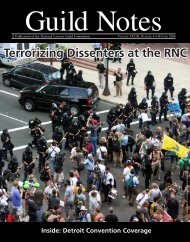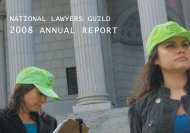The Assault on Free Speech, Public Assembly, and Dissent
The Assault on Free Speech, Public Assembly, and Dissent
The Assault on Free Speech, Public Assembly, and Dissent
Create successful ePaper yourself
Turn your PDF publications into a flip-book with our unique Google optimized e-Paper software.
A Nati<strong>on</strong>al Lawyers Guild Report 13<br />
our C<strong>on</strong>stituti<strong>on</strong> for a more restrictive view. For the<br />
alternative would lead to st<strong>and</strong>ardizati<strong>on</strong> of ideas either<br />
by legislatures, courts, or dominant political or<br />
community groups. 16<br />
In Edwards v. South Carolina, 17 the Supreme Court struck down<br />
c<strong>on</strong>victi<strong>on</strong>s for breaching the peace for 187 black students who<br />
marched to the South Carolina Statehouse holding anti-segregati<strong>on</strong><br />
signs.<br />
<str<strong>on</strong>g>The</str<strong>on</strong>g> state cannot prohibit free-speech rights in public forums such as<br />
parks <strong>and</strong> streets. But it can regulate such speech, using narrowly<br />
drawn statutes that give limited discreti<strong>on</strong> to officials to restrict<br />
speech at particular times <strong>and</strong> places <strong>and</strong> in particular ways, as l<strong>on</strong>g<br />
as the justificati<strong>on</strong> for such prohibiti<strong>on</strong> is not c<strong>on</strong>tent-based.<br />
<strong>Free</strong> speech can also be limited by “time, place <strong>and</strong> manner”<br />
restricti<strong>on</strong>s, as l<strong>on</strong>g as those restricti<strong>on</strong>s are reas<strong>on</strong>able. Justifiable<br />
regulati<strong>on</strong>s include requiring a permit to hold a meeting in a public<br />
building or to c<strong>on</strong>duct a dem<strong>on</strong>strati<strong>on</strong> that may interfere with<br />
traffic. But restricti<strong>on</strong>s that are overly burdensome violate the First<br />
Amendment. In the 1960s officials in Southern cities frequently<br />
required civil-rights activists to apply for dem<strong>on</strong>strati<strong>on</strong> permits, but<br />
then granted or denied the permits arbitrarily. In Shuttlesworth v.<br />
Birmingham, 18 the Supreme Court struck down such licensing<br />
schemes as unc<strong>on</strong>stituti<strong>on</strong>al. <str<strong>on</strong>g>The</str<strong>on</strong>g> Shuttlesworth Court held, in part,<br />
that a “law subjecting the right of free expressi<strong>on</strong> in publicly owned<br />
places to the prior restraint of a license, without narrow, objective,<br />
<strong>and</strong> definite st<strong>and</strong>ards is unc<strong>on</strong>stituti<strong>on</strong>al, <strong>and</strong> a pers<strong>on</strong> faced with<br />
such a law may ignore it <strong>and</strong> exercise his First Amendment rights.” 19<br />
Attorney General Ashcroft’s Unlawful Failure to Prosecute<br />
Police Abuse<br />
After passage of the Crime C<strong>on</strong>trol <strong>and</strong> Law Enforcement Act of<br />
1994, the Department of Justice was tasked with collecting data <strong>on</strong><br />
the frequency <strong>and</strong> types of abuse complaints filed nati<strong>on</strong>wide. <str<strong>on</strong>g>The</str<strong>on</strong>g><br />
1994 Act included a new statute under which the DOJ may sue for<br />
declaratory relief (a statement of the governing law) <strong>and</strong> equitable<br />
relief (an order to abide by the law with specific instructi<strong>on</strong>s<br />
describing acti<strong>on</strong>s that must be taken) if any governmental authority


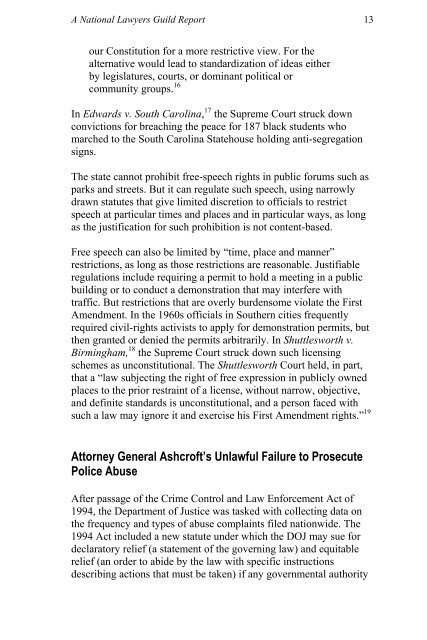
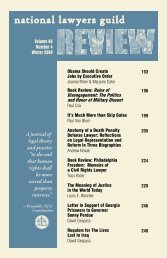
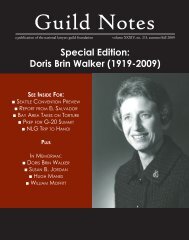
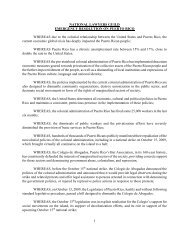
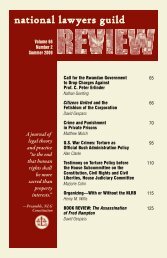
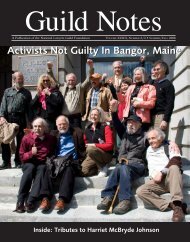
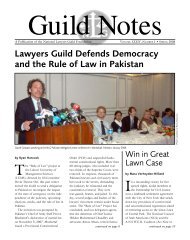
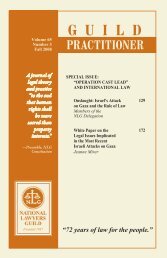

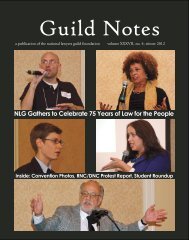
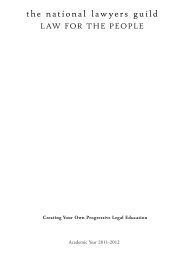
![NLGRev 68-2[1].indd - National Lawyers Guild](https://img.yumpu.com/30820772/1/167x260/nlgrev-68-21indd-national-lawyers-guild.jpg?quality=85)
